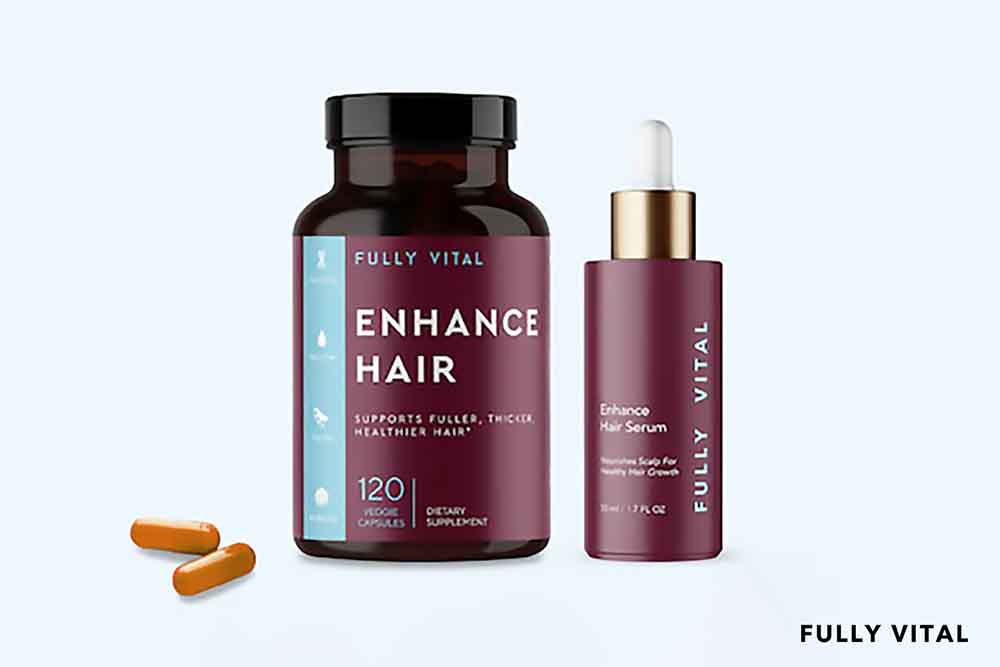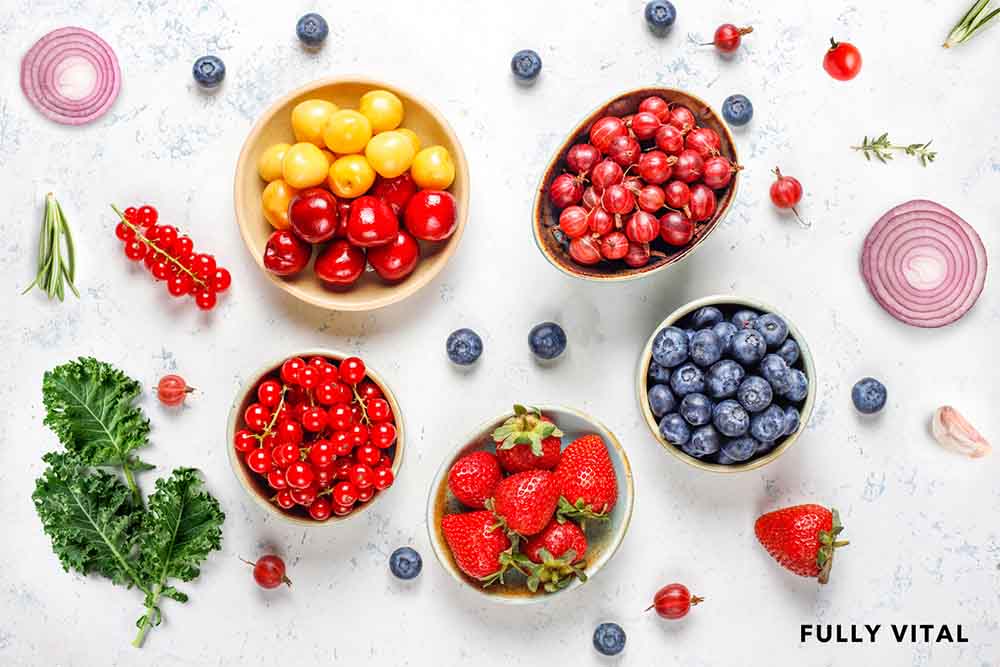
Paraben: Exploring The Facts And Alternatives
If you've ever picked up a hair growth product, chances are you've come across the term "paraben" on the ingredients list.
With all the buzz surrounding this controversial ingredient, it's natural to wonder what paraben is, why it's important, and whether it's safe for your hair.
In this article, we'll explore the ins and outs of paraben, its role in hair growth products, and what alternatives are available for those seeking a paraben-free option.

I LOVE MY HAIR NOW
FullyVital hair serum and hair vitamins made tremendous improvements in my hair. I truly love my hair now.
Dorit S.,
What Is Paraben?
Paraben is a commonly used preservative in various cosmetic and personal care products.
It is a synthetic compound that helps prevent the growth of bacteria, fungi, and other microorganisms that can degrade the product over time.(1)

Why Is Paraben Important?
Paraben plays a crucial role in ensuring the stability and longevity of many hair growth products.
By inhibiting the growth of harmful microorganisms, paraben helps maintain the effectiveness and safety of these products throughout their shelf life.
How Does Paraben Work?
Paraben acts as a preservative by disrupting the enzymatic activity of microorganisms, inhibiting their growth and preventing spoilage.
It achieves this by penetrating the cell walls of microorganisms and interfering with their metabolic processes.
What Are The Benefits Of Paraben?
Effective Preservation
Paraben has proven to be highly effective in preventing microbial contamination, thereby extending the lifespan of hair growth products.
Wide Range Of Applications
Paraben can be used in various cosmetic formulations, including shampoos, conditioners, serums, and scalp treatments.
Low Cost
Paraben is a cost-effective preservative option, making it a popular choice for manufacturers.
Are There Any Downsides To Paraben?
While paraben has been widely used in the industry for decades, concerns have been raised regarding its potential health effects.
Some studies suggest a possible link between paraben exposure and hormonal disruption.
However, regulatory bodies such as the FDA and the European Commission consider paraben safe for use in cosmetic products at approved concentrations.
What Are The Alternatives To Paraben?
Several alternative preservatives have emerged in response to consumer demand for paraben-free products.
These alternatives include:
Natural Antimicrobials
Essential oils such as tea tree oil, lavender oil, and rosemary oil possess antimicrobial properties and can be used as natural preservatives.
Grapefruit Seed Extract
Derived from the seeds of grapefruits, this extract contains compounds that inhibit microbial growth and can serve as a natural preservative.
Phenoxyethanol
This synthetic preservative has gained popularity as a paraben substitute due to its broad-spectrum antimicrobial activity.
Are Parabens Harmful?
Parabens have been extensively studied, and regulatory bodies such as the FDA and the European Commission consider them safe for use in cosmetic products within approved concentrations.
However, concerns have been raised regarding their potential health effects.
It's important to understand both sides of the argument and make informed decisions based on your personal preferences and sensitivities.
What Are The Common Uses Of Parabens?
Parabens are widely used as preservatives in various cosmetic and personal care products, including those related to hair growth.
Some common uses of parabens include:
- Shampoos and conditioners
- Hair serums and oils
- Scalp treatments and masks
- Styling products like gels, mousses, and sprays
How Do Parabens Function As Preservatives?
Parabens act as preservatives by inhibiting the growth of microorganisms that can contaminate and degrade cosmetic products over time.
Here's how they function:
Penetration
Parabens can penetrate the cell walls of microorganisms.
Enzymatic Disruption
Once inside the cells, parabens interfere with the activity of key enzymes, disrupting their metabolic processes.
Microbial Growth Inhibition
By hindering enzyme function, parabens effectively prevent the growth and proliferation of bacteria, fungi, and other harmful microorganisms.
How Can Consumers Identify The Presence Of Parabens In Products?
Consumers can identify the presence of parabens in products by checking the ingredient list on the packaging.
Look for the following common paraben names:
- Methylparaben
- Ethylparaben
- Propylparaben
- Butylparaben
- Isobutylparaben
What Are The Potential Health Risks Associated With Parabens?
While parabens have been considered safe for use in cosmetic products, some studies have raised concerns about their potential health risks, particularly in relation to hormonal disruption.
However, it's important to note that the concentrations of parabens used in cosmetic products are generally much lower than the levels studied in these controversial studies.
Here are some key points regarding the potential health risks:
Hormonal Disruption
Parabens can mimic estrogen in the body and potentially interfere with the endocrine system, although more research is needed to fully understand the extent and implications of this effect.(2)
Individual Sensitivities
Some individuals may experience allergic reactions or skin sensitivities to parabens.
If you have known sensitivities or concerns, it may be advisable to choose paraben-free alternatives.
Regulatory Approval
Regulatory bodies have set guidelines and limitations on the use of parabens in cosmetic products to ensure consumer safety.
The approved concentrations are considered safe for the general population.
What Is The History Of Paraben?
The history of parabens dates back to the late 1920s when they were first introduced as synthetic preservatives in cosmetic and personal care products.
Here are some key points about the history of parabens:
Discovery
Parabens were first synthesized by German chemist E. C. Freudenberger in 1924.
Early Usage
Parabens gained popularity in the cosmetic industry during the 1950s and became widely used due to their effectiveness and low cost.
Established Preservatives
Over the decades, parabens became established as one of the most commonly used preservatives in a wide range of products.
What Is The Current Environment Of Paraben?
The current use of parabens in cosmetic products is a subject of ongoing discussion and scrutiny.
Here's an overview of the current environment:
Regulatory Oversight
Regulatory bodies such as the FDA and the European Commission continue to monitor the use of parabens and set guidelines on their safe usage in cosmetic products.
Consumer Preferences
In recent years, there has been a growing trend towards paraben-free and natural products driven by consumer preferences for more environmentally-friendly and safer alternatives.
Industry Response
In response to consumer demand, many hair growth product companies now offer paraben-free options in their product lines.
What Does The Future Hold For Paraben?
The future of parabens in the hair growth product industry remains uncertain, with ongoing research and evolving consumer preferences.(3)
Here are some potential developments:
Continued Research
Further scientific studies may shed more light on the potential health effects of parabens and their impact on the environment.
Innovative Alternatives
The industry may witness advancements in the development of alternative preservatives that address consumer concerns while maintaining product efficacy and safety.
Evolving Regulations
Regulatory agencies may update their guidelines or introduce new regulations based on emerging research and consumer demands.
Unlock the Secret to Youthful, Luscious Hair with Fully Vital!Experience the transformational power of our science-backed hair growth products designed to combat hair aging and revitalize your locks. Discover the key features and benefits that make Fully Vital your ultimate solution for a healthier relationship with your hair:
Fully Vital is your trusted partner on your hair growth journey. Embrace the beauty of ageless hair and unlock your hair's full potential. Experience the difference today! |
Final Thoughts On Paraben
Understanding parabens and their role in hair growth products is essential for consumers seeking to make informed choices about the products they use.
While parabens have been widely used as effective as preservatives, concerns have been raised about their potential health effects and the impact on the environment.
As the hair growth product industry evolves, companies like "Fully Vital" are at the forefront of providing safe and effective alternatives to meet the needs of their diverse audience.
At "Fully Vital," we are dedicated to empowering women of all hair types with the best hair growth solutions to nurture a healthy relationship with their locks.
Our range of hair growth products is designed to combat hair aging and promote luscious, vibrant hair.
Whether you prefer paraben-free options or explore innovative formulations, "Fully Vital" has the perfect solution to stimulate your hair growth journey.
Choose "Fully Vital" for hair products that embrace both the beauty of nature and the advances of science, all aimed at helping you achieve the healthy and radiant hair you deserve.
Unlock your hair's full potential with our expertly crafted hair growth products and embrace a vibrant, confident you!
Frequently Asked Questions about Paraben
Can paraben cause hair loss?
No scientific evidence suggests that paraben directly causes hair loss.
However, if you experience any adverse reactions or scalp irritation from a product containing paraben, it's best to discontinue use and consult a healthcare professional.
Are parabens harmful to my health?
The safety of parabens has been extensively studied.
Regulatory bodies have deemed them safe for use in cosmetic products within approved concentrations.
However, if you have specific concerns or sensitivities, you may opt for paraben-free alternatives.
Are paraben-free products less effective?
Paraben-free products can be just as effective as those containing paraben.
The efficacy of a hair growth product depends on its active ingredients and formulation, rather than the presence or absence of paraben.
How can I identify if a product is paraben-free?
Look for labels that specifically state "paraben-free" or "no parabens."
Additionally, you can check the ingredient list for common paraben names, such as methylparaben, propylparaben, or butylparaben.
Can I make my own paraben-free products at home?
While it's possible to make homemade products without paraben, it's important to understand the principles of formulation and preservation to ensure product safety and effectiveness.
Proper research and knowledge of natural preservatives are crucial to creating your own paraben-free products.
Can paraben-free products have a shorter shelf life?
Paraben-free products may have a shorter shelf life compared to those containing paraben.
However, proper formulation and the use of alternative preservatives can still provide adequate product stability.
Always check the product label for recommended usage periods or expiration dates.
Is it Safe to Use Products with Parabens?
Using products with parabens is generally considered safe by regulatory bodies such as the FDA and the European Commission, as long as they are used in approved concentrations.
However, individual sensitivities and preferences vary.
If you have concerns or known sensitivities, you may opt for paraben-free alternatives.
How Long Do Parabens Stay in the Body?
Parabens are rapidly metabolized and eliminated from the body.
Studies have shown that parabens have a short half-life in human urine, ranging from a few hours to a day.
After discontinuing the use of products containing parabens, they are typically excreted within a few days.
Can Parabens Cause Skin Irritation?
Parabens can cause skin irritation or allergic reactions in some individuals, although such cases are relatively rare.
If you experience any skin irritation or adverse reactions after using products with parabens, it is recommended to discontinue use and consult a dermatologist or healthcare professional.
Do Parabens Affect Hormones?
Studies have suggested that parabens have the potential to mimic estrogen in the body and interfere with the endocrine system.
However, it's important to note that the concentrations of parabens used in cosmetic products are generally much lower than the levels studied in these controversial studies.
Regulatory bodies consider parabens safe for use in cosmetic products at approved concentrations.
More research is needed to fully understand the extent and implications of any hormonal effects.
Sources:
- FDA. (2019). Parabens in Cosmetics. Fda.gov. https://www.fda.gov/cosmetics/cosmetic-ingredients/parabens-cosmetics
- Parabens. (n.d.). Breast Cancer Prevention Partners (BCPP). https://www.bcpp.org/resource/parabens/
- Parabens Factsheet. (2019). Centers for Disease Control and Prevention . https://www.cdc.gov/biomonitoring/Parabens_FactSheet.html







